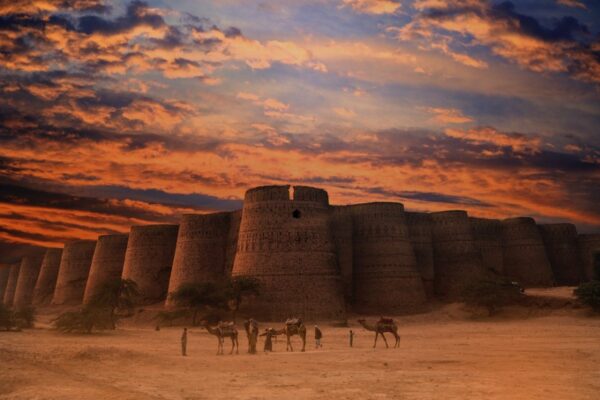Christianity is a religion originally based on revelation, having a holy book, and originally monotheistic; however, it was later transformed into the belief in trinity. There are religious concepts such as prophets, angels, afterlife and Qadar (destiny) in this religion, but they are not understood and explained in the same way as in Islam.
Contents
Trinity
In fact, Christianity is a religion based on monotheism. There are statements confirming this fact in the Bibles and other sources. The Unity of Allah is mentioned (John, V / 44). However, some phrases and figurative expressions in the same texts gave rise to the belief in trinity. Some writers of the Bible and the period between Jesus and the time of the writing of the Bibles have played an important role in this understanding. On the other hand, the trinity is not clearly expressed anywhere in the holy book of Christianity. However, some expressions such as “I and the Father are one”, “the spirit of your father”, “the spirit of God” led to some interpretations that considered Jesus and the holy spirit together with God as God.
The first person to begin these interpretations was Paul, who later joined the disciples. Paul, described as “the greatest theologian in the time of Jesus,” is known as the founder of modern Christianity. According to modern scholars, Christianity today consists more of Paul’s interpretations than of the system established by Jesus. It can even be said that the centuries that followed based their religious beliefs on Paul’s interpretations rather than the Bibles. Paul’s suggestions focused more on Jesus Messiah than on God. According to him, Jesus was not only a human being, but also a being resurrected by the power of God.
As can be seen, modern Christianity is based on Paul’s interpretations. Both the original form of the religion and the Bible, their holy book, were distorted. Christianity is a distorted religion. Therefore, the Christianity adopted by today’s Christians and the Christianity mentioned in the Quran are completely different from each other.
What does the Quran say about Christians?
In the Quran, the word “Nasrani” is used for a Christian and the word “Nasara” for Christians. (Aal-i Imran, 3/67; al-Baqara, 2/62, 111, 113, 135, 140; al-Maida, 5/14, 18, 51, 69, 82; at-Tawba, 9/30; al-Hajj, 22/17). Christians are also addressed by the verses containing the phrase “Ahl al-Kitab” (the people of the Book), such as the following verse:
“Say: ‘O people of the Book, come to an agreement between us and you that we worship none but Allah and that we have no partners with Him.’ (Aal-i Imran, 3/64)
According to the Qur’an, the Christians, like the Jews, have not kept their promise; therefore enmity and resentment will rule them until the Day of Judgment. Hz. Muhammad (PBUH) is also a messenger sent to them. He explained to them most of the things that were hidden from the People of the Book. However, Jews and Christians said that they were “Allah’s sons and lovers”; therefore they oppose Hz. Muhammad (PBUH). Jews regarded Uzayr and Christians regarded Jesus as God’s son. They became disbelievers because they deified human beings. (al-Maida, 5/12-18; at-Tawba, 9/20) They acted contrary to the essence of the religion of unity by ascribing sons to God. However, the Qur’an says the following:
“Say: He is Allah, the One, the Eternal, the Absolute, He begets not, nor is He begotten, and there is none like Him.” (al-Ikhlas, 112/1-4).
Jesus is only a messenger from Allah
The Qur’an declares that Jesus is Allah’s slave and messenger and that he conveys the message of unity. (al-Maida, 5/46-47, 62-69, 72-77). In that case, the Christians who deify Jesus say, “Allah is one of three in a trinity” (al-Maida, 5/72-75); so they deviate from the true path and move away from the line of unity. Allah calls those Christians who move away from the principle of unity to the origin of the religions, to the unity and the way of Islam. (al-Maida 5/46).
As stated above, Christianity is originally a true religion. His prophet is Jesus and his book is the Bible. Jesus, who is the focal point of modern Christianity and the basis of Paul’s theology, is God’s slave and messenger. Jesus himself expresses it this way:
He said: “Verily I am a servant of Allah: He has given me a revelation and made me a prophet; and he hath made me blessed wherever I am, and hath commanded me prayer and charity as long as I live; He has made me kind to my mother and not overconfident or miserable; so will there be peace with me the day I was born, the day I die and the day I shall be raised to life again”! (Maryam, 19/30-33).
In addition, the Christians who deified Jesus and his mother and formed the trinity creed will face Jesus on Judgment Day; thus the lies of the Christians will be exposed again. This matter is explained in the Qur’an as follows:
Dialogue in the Quran
“Allah will say: “O Jesus, son of Mary! Did you say to the people: “Worship me and my mother as gods instead of Allah”? He will say: “Holy are you, I have never been able to say anything that was not my right. And if I had said something like that, surely You would have known. Thou knowest what is in my heart, though I know not what is in thine. For You know all that is hidden. I never told them anything other than what You commanded me to say, “Worship Allah, my Lord and your Lord,” and I was a witness over them when I was among them, and when You took me up, You were the Guardian over them and You are Witness over all things. (al-Maida, 5/116, 117).
Christianity in the period of the Prophet (PBUH) was distorted, just like Christianity today.
So the Christianity of today is not the same as the Christianity that Jesus brought on. They themselves have invented statements such as “the Christians call Christ the son of Allah”. (at-Tawba, 9/30) and “and (they take as their Lord) Christ the son of Mary.” (at-Tawba, 9/31).
Likewise, today’s Christians have no relation to the Bible brought by Jesus. (al-Maida, 5/68) Like the Jewish scholars, the Christian priests have changed the decrees of the Book which Allah has sent them in return for some material benefits. (at-Tawba, 9/34)






